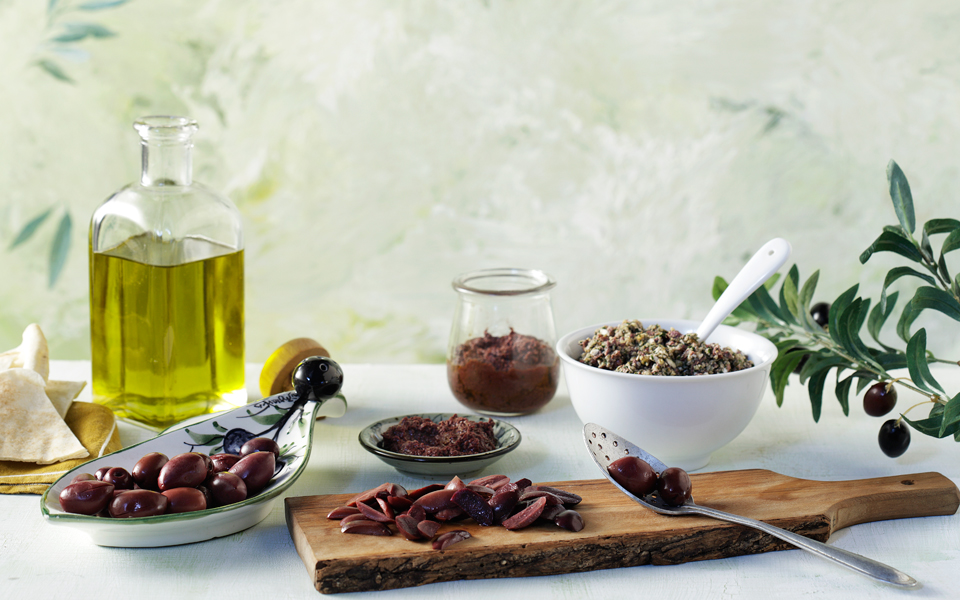The history of the olive tree in Greece predates that of the Greeks, as attested by the discovery on Santorini of petrified olive leaves estimated to be 50,000-60,000 years old. Ancient texts and age-old tombs also teem with evidence of olive production, while Ho- mer described the fruit’s precious oil as “liquid gold” and Hippocrates believed it to be “the great healer.” The goddess Athena, in fact, is fabled to have given the Athenians the first-ever olive tree, the Moria Elaia.
The glory of the olive could have been attributed to legend or fine story-telling were it not for the role it plays in the day-to-day lives of people, lives that are intrinsically linked to the olive and its oil. Greeks have built their homes around the olive tree since Homeric times. They use the oil from its fruit as a baptismal chrism, a source of nourishment and as fuel to keep alight the lanterns dedicated to their dearly departed.
Utile, revered and a dietary staple, when Greeks refer to oil, they mean olive oil.
“ A bush of long-leafed olive was growing within the court, strong and vigorous, and girth it was like a pillar. Round about this I built my chamber (Homer, odyssey, Book 23, 195-198, translation Α.Τ. murray, Harvard university Press, 1919). ”
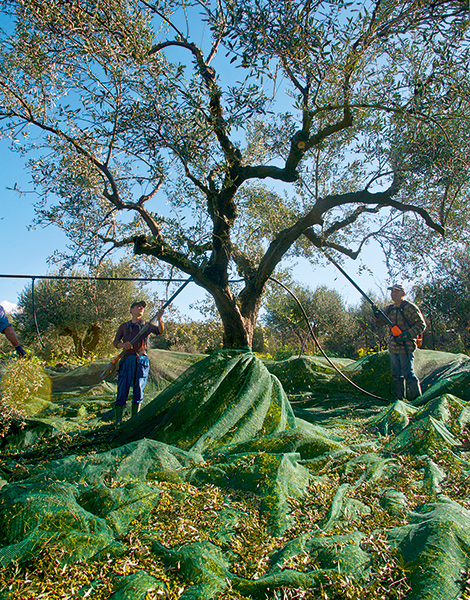
© Clairy Moustafellou
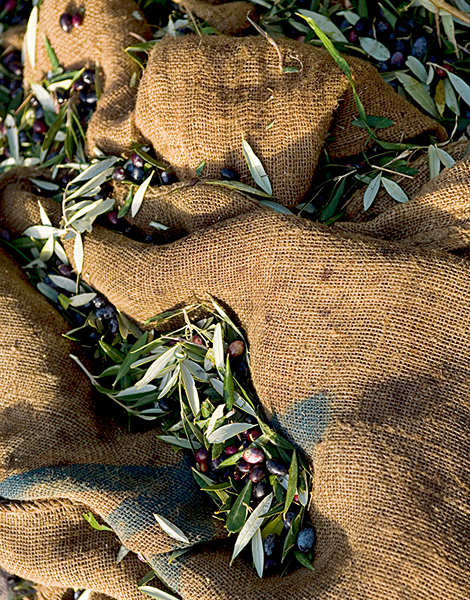
© Angelos Giotopoulos
GIFT FROM THE PELOPONNESE
If the Peloponnese in particular had a symbol, it would be the olive, treasured throughout Greece but revered here. Olive oil in the Peloponnese is a source of pride, its trademark, and the tree’s cultivation is the main activity of the region’s largely agrarian communities. The oil is a medicine and a remedy, an elixir, a drizzle of which can liven up any dish or salad.
The olive is harvested with care, by laborers with long poles atop ladders who gently shake off the fruit into large swathes of cloth to protect it from bruising. The fruit is then ground by large millstones and slowly churned in a process known as malaxation to gradually extract the precious oil, drop by drop, which is stored in large steel tanks to prevent oxidization.
From the hills to the plains, the Peloponnesian earth is conducive to olive growing, with good drainage, constant rejuvenation thanks to favorable winds that stir up the soil, proximity to the sea and a temperate climate.
The main variety cultivated throughout the Peloponnese is the Koroneiki. On the eastern coast they also grow Manaki and in Laconia, in Sparta and its environs, Athinolia is widespread. Each of these has its own distinctive flavor profile. Koroneiki produces bold and slightly bitter oil; Manaki is more balanced but full-bodied; and Athinolia is smooth, fruity and fragrant. The varieties are also blended, usually on a robust Koroneiki base. Mixed with Athinolia, it gives a strong yet fragrant oil, while with Manaki the result is a more balanced, well-rounded bittersweet flavor.
“ The Peloponnesian earth is conducive to olive growing, with good drainage, constant rejuvenation thanks to favorable winds that stir up the soil, proximity to the sea and a temperate climate. ”
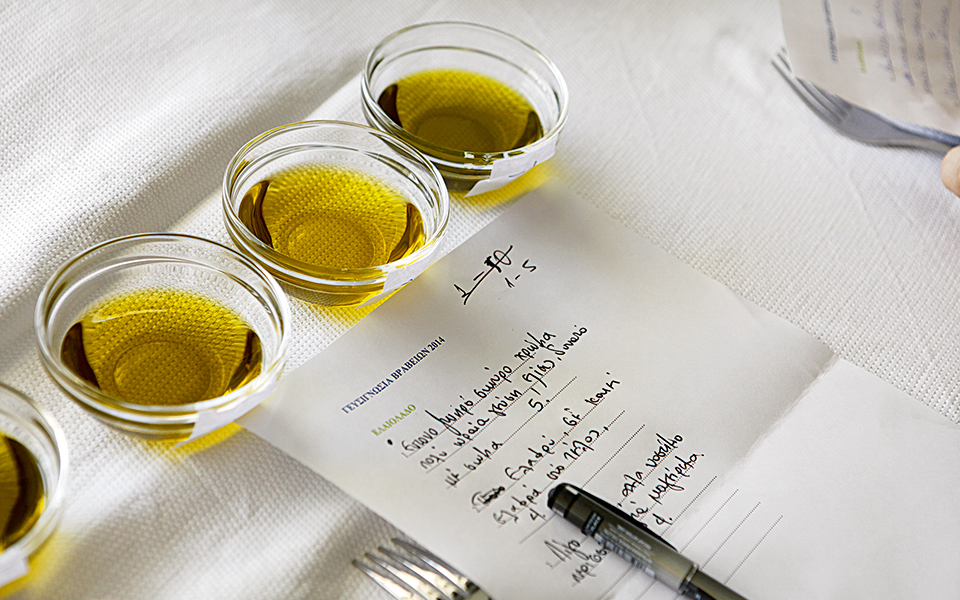
© Katerina Kampiti
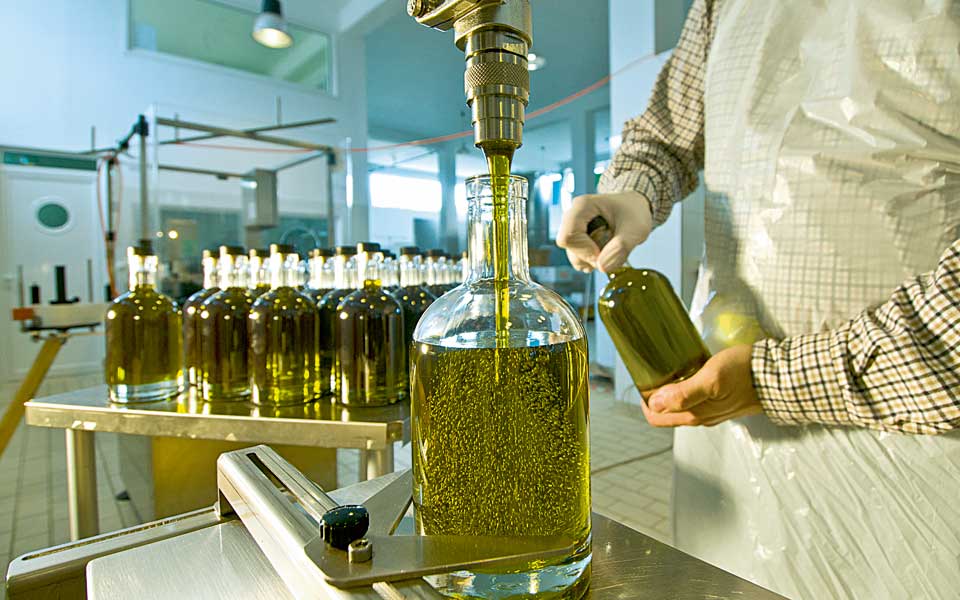
© Vangelis Zavos
IN NUMBERS
Sixty percent of Greece’s arable land is given over to olive trees and there are about 132 million trees growing in this country of 11 million people, producing about 300,000 to 350,000 tons of oil a year. Of this, 65 percent comes from the Peloponnese. Greece ranks third in global production behind Spain and Italy, and 85 percent of its olives are defined as “extra virgin,” meaning they have few impurities.
Half of national production (around 150,000-175,000 tons) is exported to the European Union and particularly to Italy, which absorbs three-quarters of the outgoing product. The remainder stays in the domestic market, making Greeks, who are estimated to use 18 kilos per person per year, the leaders in per capita olive oil consumption, above Spain’s average of 12 kg/year and Italy’s 10 kg/year.
MAXIMIZING THE ADVANTAGE
Until recently, olive oil producers in the Peloponnese were more concerned with improving the quality of their olive oil than boosting its actual commercial value – much like Olympic athletes competing for honor and an olive wreath. Satisfied with production, most growers sold it – and many continue to do so – at extremely low prices to the Italians, who had become savvy to modern marketing much earlier than their Greek colleagues. Today, local producers are becoming more aware of the comparative advantages of Peloponnesian olive oil and an increasing number are selling their oil in well-designed, attractive packaging directly to foreign markets or using it to make innovative health and skin-care products. A series of awards and accolades at international events has been instrumental in this progress, as too have numerous academic studies pointing to the benefits of olive oil consumption and highlighting the qualities of the Peloponnese’s oil in particular.
“ Today, local producers are becoming more aware of the comparative advantages of Peloponnesian olive oil and an increasing number are selling their oil in well-designed, attractive packaging directly to foreign markets. ”
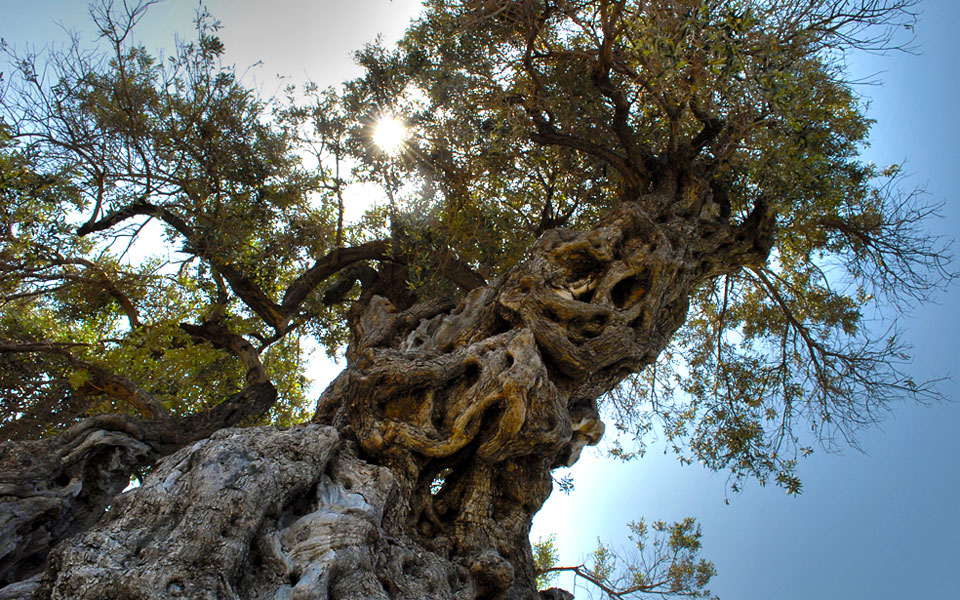
© George Xygos
THE BENEFITS
If you ask an elderly man or woman in a Messinian village to share the secret to longevity, they will probably say: “good oil, no stress.” Studies have shown that olive oil’s phenol content helps combat “bad” cholesterol (LDL) and prevent cardiovascular disease. Newer research is also stressing its anti-inflammatory qualities, finding that it can have a beneficial effect on genes and help prevent cancer. What is less known to the general public is that not all olive oils have the same beneficial properties, even when they may be in the same category, for instance extra virgin. The European Union has laid down standards regulating how olive oil can be described in terms of benefits.
Meanwhile, studies by Athens University Medical School, headed by pharmacology professor Prokopis Magiatis, and in cooperation with several US universities, have shown that areas such as Messinia and Laconia produce olive oils with up to 50 percent more beneficial properties than EU standard requirements but also above the aver- age found in the majority of oils on the international market.
“ Not all olive oils have the same beneficial properties, even when they may be in the same category, for instance extra virgin. ”

